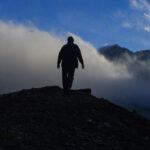The strangest thing about this May long weekend?
Is that it didn’t snow.
This is the second year in a row that it hasn’t snowed May long weekend.
Indeed, this year was about as atypical a May long as you ever did see, considering that the only thing that is dependable about the weather is that it is always changing.
As we are wont to do on long weekends (or, indeed, any weekend that we can manage), the wife and I went camping. She had things to do in Grande Prairie, so we stayed at Swan Lake Provincial Park just outside of Dawson Creek. In a beauty contest, Swan Lake would be wearing the consolation ribbon, especially compared to some of the parks around here, but it was practical, so we didn’t complain about the lack of beauty.
Indeed, you couldn’t see anything to complain about.
Arriving on Friday, the park was awash in smoke from forest fires.
Indeed, I couldn’t even see the far shore, barely a kilometre away.
Instead, an angler in a kayak hung suspended in greyness, sky and water nearly indistinguishable one from another.
Saturday evening saw a few sprinkles of rain, and Sunday dawned bright and clear and mostly smoke free. “The rain must have washed the smoke away,” said many.
But that’s not really the way things work, and Monday (today, when I am writing this) dawned cool and wet and smoky.
“The worst of both worlds,” I joked as I stepped out into the campfire rain to start putting things away.
But you know what? I’m not complaining.
Well, I am about the smoke. It would be great if that were to go away.
But with rainfall warnings issued for many of the areas that have been impacted by wildfires, here’s hoping we are out of wildfire season for at least a month or two.
Rain helps for a variety of reasons. Cooler temperatures, moist air and hydrated vegetation help keep the fires down.
And while the hottest fires will cause the rain to evaporate before it actually hits the fire, it slows the fire’s progress.
But rain also brings with it the possibility of lightning, and that, more than anything, is what causes fires in this corner of the world.
Just look at Tumbler Ridge’s first forest fire of the season. It was started by lighting.
Fortunately a quick response from BC Wildfire and the rain has hopefully knocked that fire out.
But you get a sense of how odd it is to be seeing forest fires like this so early in the year by looking at our cover photo, provided by Mackenzie.
Don’t look at the smoke rising or the helicopter dumping water. Look around the fire. In the foreground. In the background.
There’s still snow.
There’s still snow on the ground as a wildfire burns.
This boggles my mind. It seems wrong, somehow. But this is the world we are living in. Or at least, this is the year we are living in.
Of course, too much rain can be as problematic as not enough rain. In the last twenty years, Tumbler Ridge has had at least three once in a hundred year events, which seems to me to be either bad math or something is actually changing out there with the climate.
And too much rain after a forest fire? Can be disastrous. Flash floods are particularly common after wildfires and even areas that are not usually prone to flooding are at risk, due to changes to the landscape caused by fire.
It has become such an issue that the government even has a brochure about the dangers of Landslides and Flooding Risks due to Wildfires (that’s the brochure name, if you wanted to search for it online).
So, why do fires cause floods? There’s a variety of reasons. The first is that vegetation thrives on water; trees and plants absorb water.
They also break up the flow of water and slow it down, allowing it to soak into the ground faster.
It also bakes the ground, making it less absorbent.
So you have more water, running faster over ground that is not as absorbent as it used to be. Trees no longer have the same root structures and are pushed over by water. Rocks come loose and water starts to build up in these indentations, causing the ground to liquefy.
And suddenly, instead of a flood, you have a landslide. (This can also be brought on by logging, too, but we’re focusing on fires right now.)
Fortunately, it doesn’t look like we’ll have to worry about a period of long term rainfall; by the time you read these words, chances are the rain has ended and we’re back to unseasonably warm weather (historically, the average high for this time of year is just under 20 degrees; the forecast into the weekend is 20 degrees plus).
Which puts us back at risk of fires, and smoke from wildfires.
According to Environment Canada, wildfire smoke can be harmful, even at low concentrations.
If you have lung disease, such as asthma, if you have heart disease, if you are older or younger children or pregnant or work outdoors, you are at a higher risk of experiencing health effects caused by wildfire smoke.
Stop or reduce your activity level if breathing becomes uncomfortable or you feel unwell.
Drinking lots of water can help your body cope with the smoke.
Take a break from the smoke at a location where you can find clean, cool air, like the Community Centre.
And finally, if you must spend time outdoors, a well-fitted respirator type mask can help reduce your exposure to the fine particles in smoke.
Basically, as always, be careful out there, take care of each other, and don’t push yourself too hard. Because if it’s not one thing, it’s another.
Trent is the publisher of Tumbler RidgeLines.

